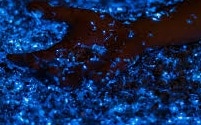Plankton is a term from the Greek word plankton which can be translated as that which "wanders" . The idea of plankton refers to the set of plants and animal species of tiny size that live in fresh or salt waters and move by the action of currents .
In addition to everything indicated, we cannot ignore that the term plankton that concerns us now was created by the German zoologist Christian Andreas Victor Hensen (1835 – 1924). This scientist gave shape to the aforementioned in 1887.
 Plankton are made up of microscopic living things that float in water . These are not organisms with active movement, but rather they move from aquatic undulations.
Plankton are made up of microscopic living things that float in water . These are not organisms with active movement, but rather they move from aquatic undulations.
It is possible to classify plankton in different ways. The traditional division distinguishes between animal plankton or zooplankton and plant plankton or phytoplankton .
Zooplankton includes larvae of arthropods, crustaceans and other animals and protozoa . Their diet is based on the intake of organic matter that has already been processed. Phytoplankton , on the other hand, are formed with autotrophic organisms that carry out photosynthesis.
Another possibility is to differentiate between non-permanent plankton or meroplankton and permanent plankton or holoplankton . While in meroplankton there are beings that, when they grow, abandon this type of community , the members of holoplankton remain in the group throughout their lives.
It is important to note that plankton components can make daily vertical migrations . This is because zooplankton approach the surface at night to feed and then move away to avoid solar radiation. Phytoplankton, on the other hand, need to remain close to the surface for the development of photosynthesis .
It should be noted, on the other hand, that plankton plays a relevant role in the food chain . Plant plankton is the food for animal plankton, which in turn is consumed by different larvae. The larvae are the food of small fish, ingested by larger fish that are eaten by the main oceanic predators.
We cannot ignore that, for some time now, plankton has been incorporated as food into the gastronomic field. Specifically, we are referring to marine plankton, which has become popular and incorporated into that sector thanks to the Andalusian chef Ángel León. This has incorporated this element as an ingredient in a wide variety of recipes. We are referring to pizzas, sauces, pasta dishes and even rice.
He has given such relevance to said product that he now proceeds to 'cultivate' it in marine gardens. And that point has been reached after the aforementioned chef invested a year in being able to obtain that plankton from the phytoplankton found in the Bay of Cádiz.
Plankton is considered to be a very beneficial food because it provides the body with vitamins, specifically type C and E, and because it is rich in antioxidants. In the same way, we cannot ignore the one that provides omega 3, which has a large amount of protein and has significant nutritional value.
Not to mention that plankton also provides a touch of originality and surprise to any dish. And a good example of this are the touches of this type that he gives to some of the most interesting culinary proposals of the aforementioned chef. Among those are carrot tempura with plankton or marine plankton brioche.
